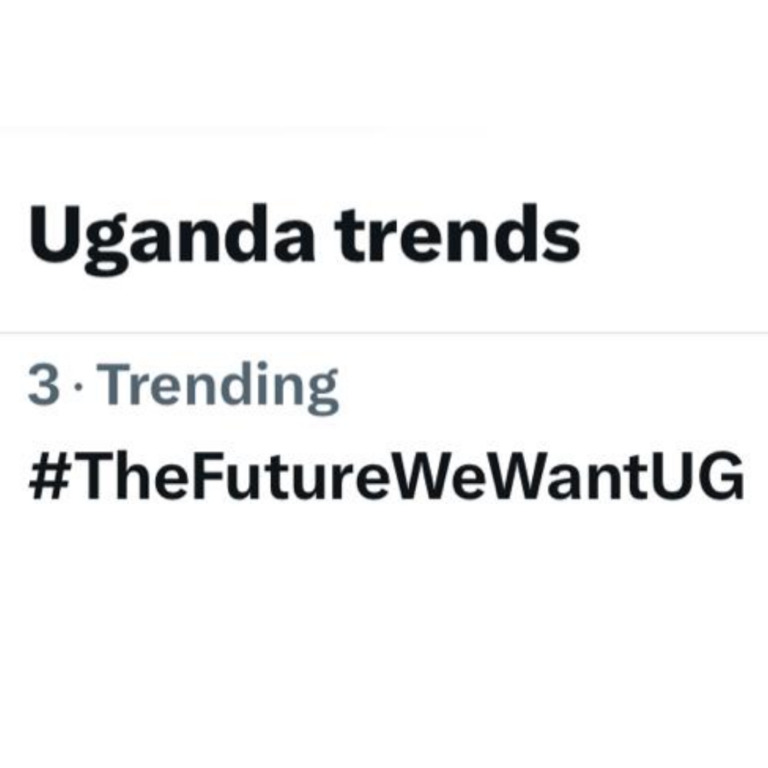In a social media phenomenon that has captured the attention of millions, the youth have unleashed a storm on Twitter with their rallying cry for a brighter future. Under the trending hashtag #TheFutureWeWantUG, young voices across Uganda have taken the platform by storm, shedding light on their vision for a transformed Uganda in the near future.
The breadth of topics addressed by these impassioned individuals is nothing short of remarkable. Empowerment of women and girls, combatting sexual and gender-based violence and harmful practices, bolstering education and skills development for young people, ensuring universal access to sexual and reproductive healthcare information and services , championing mental health awareness, and advocating for improved mobility and societal inclusivity are just a few of the pressing issues that have flooded the digital landscape.
One prominent voice in this movement is Viola Happiness, who boldly highlighted the stark inequalities plaguing the healthcare system. Happiness shed light on the distressing reality that rural areas face significant challenges in accessing quality healthcare due to limited infrastructure and a scarcity of healthcare professionals. This glaring disparity not only undermines the delivery of essential healthcare services but also hampers broader efforts to enhance overall health outcomes. Happiness’s thought-provoking question—What is #TheFutureWeWantUG?—resonates with Twitter users who share her concerns and call for urgent action.
Beewol, another prominent young advocate among the youth, has ignited contemplation and introspection through his piercing queries. By asking, “What kind of future do we envision for young people? What sort of future do we reckon young people should have?” Beewol pushes for a collective examination of values, aspirations, and the necessary steps to shape a prosperous tomorrow. These profound questions compel us to reflect on the society we strive to build for the next generation.
Methia Nabawadda, not to be left behind, seeks to stimulate engagement by posing a question about the education system. With the hashtag #TheFutureWeWantUG, Nabawadda prompts Twitter users to share the knowledge and skills they wished they had acquired during their own school years. The ensuing discussions delve into critical issues surrounding educational gaps, the relevance of curricula, and the need for comprehensive preparation to equip young people for the challenges that lie ahead.
Immaculate Ninsiima, yet another voice echoing through the digital realm, passionately advocates for the eradication of violence against women and girls and ending the high rates of teenage pregnancy in the country.
Shockingly, she highlights the distressing statistic that approximately 22% of women aged 15-49 in Uganda have endured sexual violence at least once in their lifetime. Ninsiima’s call to action—putting an end to violence against women and girls is #TheFutureWeWantUG—rings loud and clear, resonating with a society striving for gender equality and social justice.
Even Twitter-famous Dr. Kizza Blair has lent his weight to this growing movement. With a sizable following, Dr. Blair has posed thought-provoking questions that force us to confront uncomfortable truths. He draws attention to the harmful practice of Female Genital Mutilation and challenges the acceptability of subjecting young children to such rituals in the name of sexual preparation. Dr. Blair’s contribution adds an extra layer of depth to the ongoing conversation and compels us to re-evaluate deeply ingrained societal norms.
Uganda, with one of the world’s youngest and most rapidly growing populations, is fertile ground for the rise of these influential young voices. The United Nations Development Programme (UNDP) reports a staggering population growth rate of 3.7% in the country. The emergence of this Twitter movement signifies the youth’s unwavering commitment to actively participate in shaping their nation’s destiny.
This digital uprising, centered on the hashtag #TheFutureWeWantUG, has captivated the attention of a nation. With their impassioned expressions and thought-provoking questions, Uganda’s young advocates are fueling a powerful discourse that transcends virtual boundaries. Their voices resonate with the hopes and dreams of an entire generation, while inspiring others to join the cause. As the movement gains momentum, it is clear that the youth of Uganda are poised to drive transformative change and usher in a future that aligns with their aspirations.

